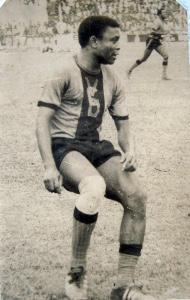Stephanus Pedalianus
 Stephanus Pedalianus playing against Entropan in the 1940 Terraconservan Cup | ||||
| Personal information | ||||
|---|---|---|---|---|
| Full name | Stephanus Pedalianus | |||
| Date of birth | 5 November 1910 | |||
| Place of birth | Cautica, SE Perfuliam, New Illyricum | |||
| Date of death | 19 April 1986 (aged 75) | |||
| Place of death | Vesevio, SE Apollonia, New Illyricum | |||
| Height | 1.85 m (6 ft 1 in) | |||
| Playing position(s) | Forward | |||
| College career | ||||
| Years | Team | Apps | (Gls) | |
| 1927–1928 | Trurnia University | 26 | (32) | |
| Senior career* | ||||
| Years | Team | Apps | (Gls) | |
| 1929–1931 | Inter Cautica | 30 | (11) | |
| 1931–1942 | EF Trurnia | 225 | (154) | |
| 1942–1948 | EF Turis | 123 | (56) | |
| National team | ||||
| 1936–1948 | New Illyricum | 48 | (40) | |
| Teams managed | ||||
| 1955-1958 | EF Trurnia | |||
| 1958-1964 | Inter Etruricum | |||
| 1964-1971 | EF Trurnia | |||
Honors
| ||||
| * Senior club appearances and goals counted for the domestic league only | ||||
Stephanus Pedalianus (November 11, 1910 - April 19, 1984) was a New Illyrian football forward who is considered one of the greatest players in New Illyrian football history and won a record 12 titles in the New Illyrian Premier Football League (PLFNE). Stephanus won seven Aureae Sophorae including five straight from 1931 to 1935 with EF Trurnia and is the all time goals leader in the PLFNE, with a total of 231.
Early Life
Stephanus was born in 1910 in Cautica in SS Perfuliam and grew up around football, as his father and uncle were both professional players for several teams, including EF Turis and Penta Urbe. Stephanus spent much of his childhood honing his skills and was already a top recruit by age fourteen.
However he was required to serve a year in the New Illyrian Armed Forces in 1924 and was conscripted into the New Illyrian Foreign Army, and sent to Rakhman to fight in the Rakhmani Civil War. Stephanus did not see action the war, as New Illyricum pulled out just three weeks after his arrival and he returned back to Illyricum in early August 1924. Stephanus then was deployed to Fieri with the Foreign Army where he served for a year in 1925 fighting for the communist rebels near Lak'as.
Stephanus returned in 1926 after being badly wounded and was awarded the Medal of Valus for his service. Stephanus started to study law at Trurnia University in 1927, where his football talent resurfaced when he led the University to the national collegiate title in 1927 and 1928 as a forward. Stephanus was approached by the manager of Inter Cautica after his graduation and decided to join the small club for a salary of just 50 denareos per appearance.
